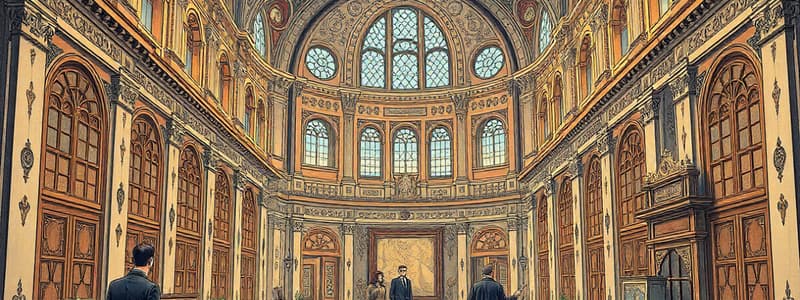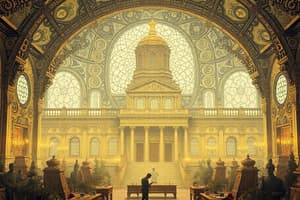Podcast
Questions and Answers
What is a possible consequence of congressional lack of guidelines for bureaucrats?
What is a possible consequence of congressional lack of guidelines for bureaucrats?
- Bureaucrats are always fired for poor performance
- Bureaucrats have no discretion in policy implementation
- Bureaucrats exercise discretion in implementing policies (correct)
- The average member of Congress has more expertise in policy areas
What does the Hatch Act limit for federal workers?
What does the Hatch Act limit for federal workers?
- All forms of political participation
- Political fundraising activities
- Political activities while on duty (correct)
- The ability to vote in elections
Which type of judicial selection approach is associated with the Missouri Plan?
Which type of judicial selection approach is associated with the Missouri Plan?
- Legislative appointment by state legislature
- Governor selects from a list provided by a committee (correct)
- Governor appoints judges without any process
- Judges are elected directly by the public
What is 'judicial review' as established by Marbury v Madison?
What is 'judicial review' as established by Marbury v Madison?
What does the concept of 'bureaucratic drift' refer to?
What does the concept of 'bureaucratic drift' refer to?
What is the primary role of a plaintiff in a court proceeding?
What is the primary role of a plaintiff in a court proceeding?
Why are cases with significant interest group activity more likely to be heard by the Supreme Court?
Why are cases with significant interest group activity more likely to be heard by the Supreme Court?
What is meant by the term 'red tape' in bureaucratic contexts?
What is meant by the term 'red tape' in bureaucratic contexts?
What is the primary source of funding for federal policies in the U.S.?
What is the primary source of funding for federal policies in the U.S.?
Which of the following statements best describes mandatory spending?
Which of the following statements best describes mandatory spending?
What distinguishes a progressive tax from a regressive tax?
What distinguishes a progressive tax from a regressive tax?
What is the definition of unilateral action in foreign policy?
What is the definition of unilateral action in foreign policy?
Why might the Baby Boomer generation put a strain on the Social Security system?
Why might the Baby Boomer generation put a strain on the Social Security system?
Flashcards
Bureaucratic Discretion
Bureaucratic Discretion
The ability of government officials to make choices about how to implement policy when specific guidelines are not provided by Congress.
Hatch Act
Hatch Act
A law that limits political activity by federal workers, but allows them to vote.
Political Appointee
Political Appointee
A government worker who is selected by an elected official, often based on their political views.
Civil Servant
Civil Servant
Signup and view all the flashcards
Regulations
Regulations
Signup and view all the flashcards
Red Tape
Red Tape
Signup and view all the flashcards
Plea Bargaining
Plea Bargaining
Signup and view all the flashcards
Judicial Review
Judicial Review
Signup and view all the flashcards
Mandatory Spending
Mandatory Spending
Signup and view all the flashcards
Regressive Tax
Regressive Tax
Signup and view all the flashcards
Progressive Tax
Progressive Tax
Signup and view all the flashcards
Entitlement Program
Entitlement Program
Signup and view all the flashcards
Foreign Policy
Foreign Policy
Signup and view all the flashcards
Study Notes
Bureaucracy
- Bureaucrats have flexibility in implementing policies due to a lack of specific guidelines from Congress.
- Bureaucrats often have more specialized knowledge in their policy area than average congressional members.
- Early Americans were wary of a strong federal bureaucracy, partly due to experiences during the Revolutionary War.
- Civil servants are rarely fired from their government jobs.
- The Hatch Act restricts the political activities of federal employees, but employees can still vote.
- Presidents select heads of bureaucratic departments to exert control over their actions.
- Congress monitors bureaucracy through oversight methods, such as "fire alarm" and "police patrol."
- Bureaucratic drift is still a concern today.
- Citizens often interact with the bureaucracy in daily life.
- A political appointee is a government worker chosen by an elected official.
- Civil servants are hired based on qualifications.
- The bureaucracy implements government policy through regulations.
- Regulations are developed through a notice and comment procedure.
- Red tape refers to unnecessary and complex bureaucratic procedures.
- Congress conducts hearings to investigate the bureaucracy, a form of oversight.
Courts
- Plea bargaining is the process where most cases are settled out of trial.
- The plaintiff initiates a legal case.
- The defendant is the party against whom the case is filed.
- Precedent refers to earlier court decisions that guide future cases.
- Cases with substantial interest group involvement are more likely to be heard by the Supreme Court.
- The concept of a "living Constitution" suggests that the legal system should adapt to modern societal changes.
- Supreme Court decisions are often influenced by the justices' ideological leanings.
- Supreme Court rulings lack enforcement power.
- Marbury v. Madison established the principle of judicial review.
- Judicial review allows the court to determine if laws are constitutional.
- The Missouri Plan for selecting judges involves a governor nominating candidates from a list.
- FDR's court-packing plan sought to influence Supreme Court rulings in favor of his New Deal policies.
Economic and Social Policy
- Congress controls government funding.
- Mandatory spending is legally required.
- Regressive taxes (e.g., payroll, sales) affect lower-income earners disproportionately.
- Progressive taxes (e.g., income) affect higher earners disproportionately.
- New Deal policies have lasting impact.
- Social Security is a popular U.S. program.
- Baby boomers will strain the Social Security system due to their retirement.
- Republicans are trying to reform Social Security.
- Medicaid and Medicare are government programs offering benefits.
- The U.S. Treasury produces currency.
- State governments are responsible for education and welfare.
- National debt represents the federal government's accumulated borrowing.
- Fiscal policy refers to government decisions on taxation and spending.
- Baby boomers are Americans born between 1946 and 1964.
Foreign Policy
- Foreign policy involves actions related to other countries and groups.
- Foreign policy can include military, economic, human rights, environmental, and assistance initiatives.
- Unilateral actions are taken by a single country.
- Multilateral actions are performed with other countries.
- The U.S., Russia, China, Great Britain, and France are permanent members of the UN Security Council.
- Foreign trade is an important part of the U.S. economy.
- Isolationism proposes U.S. non-involvement in foreign affairs.
- The League of Nations preceded the United Nations.
- Military strength alone is not a guarantee of success in foreign policy.
Studying That Suits You
Use AI to generate personalized quizzes and flashcards to suit your learning preferences.




